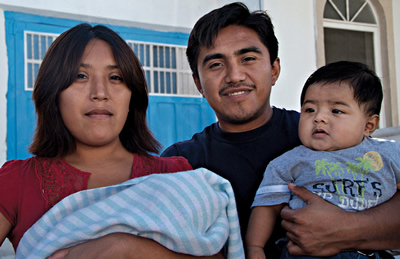ECLAC and UNICEF Examine Parental Leave in the Region
Joint publication analyses the progress and pending debts in the area of childcare in Latin America and the Caribbean.

(16 September 2011) The twelfth issue of the bulletin Challenges, launched today by ECLAC and UNICEF, states that formal wage earners in Latin America have on average three months maternity leave, which must commence before the expected date of delivery and is shorter than the 14-week minimum established by ILO Maternity Protection Convention No. 183.
The only countries which provide longer maternity leave are Chile, Cuba and Venezuela with 18 weeks, and Brazil which allows public employees six months.
In most of the countries, paternity leave varies between two and five days per birth. The length of leave is longer only in Ecuador (10 days), Venezuela (14 days) and Cuba (6 months which can be shared with the mother).
According to María Nieves Rico, Social Affairs Officer of ECLAC Division for Social Development, and Laura C. Pautassi, Researcher for the National Scientific and Technical Research Council (CONICET) in Argentina, maternity leave in the Caribbean is usually no longer than 13 weeks and the percentage of the salary covered also varies, while paternity leave is almost non-existent.
In the main article of the bulletin entitled "Childcare leave. Rights for children, fathers and mothers", the authors examine the progress made in regional legislation, for example, the comparison between birth and adoption and the gradual extension of paternity leave.
However, they also suggest that "childcare must be recognized as a universal right and must not be subject to certain conditions relating to the parents insertion in the labour market".
At present, labour laws do not include benefits for informal workers, self-employed, part-time employees, rural workers, and their sons or daughters.
"The State must maximize limited existing resources, increase social expenditure on early childhood from birth and act as provider and guarantor of quality care," state Rico and Pautassi, who believe that it is necessary to adopt a comprehensive approach which considers children's rights, gender equality and inclusive social policy.
The authors suggest a reforms programme which does not associate the wage earned by the father or mother with the parental leave issued and childcare services; establishes universal free coverage for education, care and health services for early childhood; implements and extends paid paternity leave; and implements leave to care for children.
They also recommend that businesses are obliged to provide childcare centres, regardless of the gender of their employees; provide families with resources while acknowledging the financial cost of care; and support the cost and provision of care services in the private sector by means of subsidies or tax exemptions.
Finally, they suggest developing satellite accounts as part of resource budgeting for early childhood; linking social policies to childcare policies; and considering childcare as more than a private or individual decision, among others.
Challenges is a joint publication produced by the Economic Commission for Latin America and the Caribbean (ECLAC) and the United Nations Children's Fund (UNICEF) which records the progress towards achieving the Millennium Development Goals on childhood and adolescence.
Challenges No.12 is available on the ECLAC website.
Any queries should be addressed to Tamar Hahn UNICEF Regional Office for Latin America and the Caribbean. E-mail: thahnunicef.org; Telephone: 507 66763216; or the ECLAC Public Information and Web Services Section. E-mail: dpisantiagocepal.org; Telephone: (56 2) 210 2040.
Country(ies)
- Latin America and the Caribbean
Contact
Public Information Unit
- prensa@cepal.org
- (56 2) 2210 2040